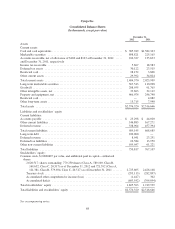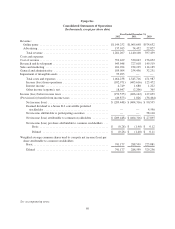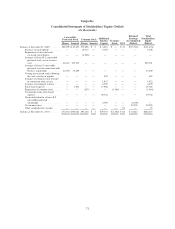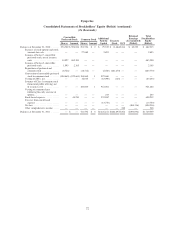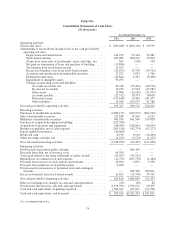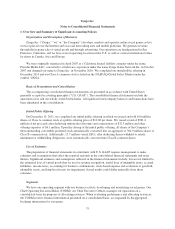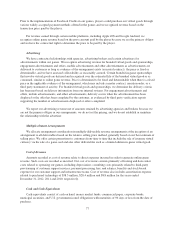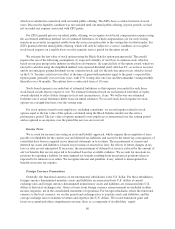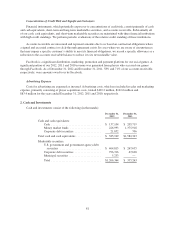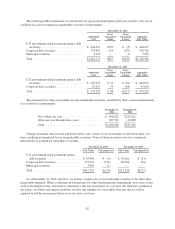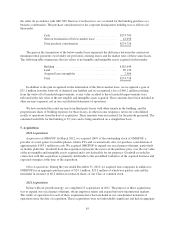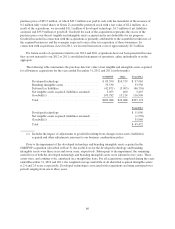Zynga 2012 Annual Report Download - page 84
Download and view the complete annual report
Please find page 84 of the 2012 Zynga annual report below. You can navigate through the pages in the report by either clicking on the pages listed below, or by using the keyword search tool below to find specific information within the annual report.Revenue Recognition
We derive revenue from the sale of virtual goods associated with our online games and the sale of
advertising.
Online Game
We operate our games as live services that allow players to play for free. Within these games, players can
purchase virtual currency to obtain virtual goods to enhance their game-playing experience. Players can pay for
our virtual currency using Facebook Credits when playing our games through the Facebook platform, and can use
other payment methods such as credit cards or PayPal on other platforms. We also sell game cards that are
initially recorded as a customer deposit liability which is included in other current liabilities on the consolidated
balance sheet, net of fees retained by retailers and distributors. Upon redemption of a game card in one of our
games and delivery of the purchased virtual currency to the player, these amounts are reclassified to deferred
revenue. Advance payments from customers that are non-refundable and relate to non-cancellable contracts that
specify our obligations are recorded to deferred revenue. All other advance payments that do not meet these
criteria are recorded as customer deposits.
We recognize revenue when all of the following conditions are satisfied: (1) there is persuasive evidence of
an arrangement; (2) the service has been provided to the player; (3) the collection of our fees is reasonably
assured; and (4) the amount of fees to be paid by the player is fixed or determinable. For purposes of determining
when the service has been provided to the player, we have determined that an implied obligation exists to the
paying player to continue displaying the purchased virtual goods within the online game over their estimated life
or until they are consumed. The proceeds from the sale of virtual goods are initially recorded in deferred revenue.
We categorize our virtual goods as either consumable or durable. Consumable virtual goods represent goods that
can be consumed by a specific player action. For the sale of consumable virtual goods, we recognize revenue as
the goods are consumed, which approximates one month. Durable virtual goods represent virtual goods that are
accessible to the player over an extended period of time. We recognize revenue from the sale of durable virtual
goods ratably over the estimated average playing period of paying players for the applicable game, which
represents our best estimate of the estimated average life of durable virtual goods. If we do not have the ability to
differentiate revenue attributable to durable virtual goods from consumable virtual goods for a specific game we
recognize revenue on the sale of durable and consumable virtual goods for that game ratably over the estimated
average period that paying players typically play that game.
Future usage patterns may differ from historical usage patterns and therefore the estimated average playing
periods may change in the future. We assess the estimated average playing period for paying players and the
estimated average life of our virtual goods quarterly. Changes in estimated average playing period for paying
players in 2012 resulted in an increase in revenue of $14.1 million and will result in an offsetting reduction of
2013 revenue in the same amount.
We estimate chargebacks from Facebook and third-party payment processors to account for potential future
chargebacks based on historical data and record such amounts as a reduction of revenue.
In May 2010, we entered into an agreement with Facebook that required us to accept Facebook Credits as
the primary in-game payment method for our games played through the Facebook platform. The agreement
required us to begin migrating our games to Facebook Credits in our games beginning in July 2010, and by April
2011 this migration was complete. Facebook Credits is Facebook’s proprietary virtual currency that Facebook
sells for use on the Facebook platform. Under the terms of our agreement, Facebook sets the price our players
pay for Facebook Credits and collects the cash from the sale of Facebook Credits. Facebook’s current stated face
value of a Facebook Credit is $0.10. For each Facebook Credit purchased by our players and redeemed in our
games, Facebook remits to us $0.07, which is the amount we recognize as revenue. We recognize revenue net of
the amounts retained by Facebook because we do not set the pricing of Facebook Credits sold to our players.
76




